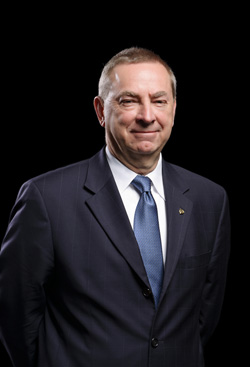Nigel Lockyer of Canada’s TRIUMF lab named Fermilab director
Nigel Lockyer, director of Canada’s TRIUMF laboratory for particle and nuclear physics and a professor of physics and astronomy at the
 |
| Nigel Lockyer (credit by Fermilab) |
University of Chicago President Robert J. Zimmer made the announcement today in his capacity as Chairman of the Board of Directors of Fermi Research Alliance, LLC. The appointment was approved by the University of Chicago and Universities Research Association, Inc., partners in Fermi Research Alliance, which operates the laboratory for the U.S. Department of Energy. The appointment concludes a nine-month international search conducted by a 15-member committee led by retired Lockheed Martin CEO and member of the URA Board of Trustees Norman Augustine.
An experimental particle physicist, Lockyer, 60, has directed TRIUMF since May 2007. Under his leadership, TRIUMF formulated a vision for ascending the world stage in nuclear physics using rare-isotope beams to address some of the most fundamental questions in science. The flagship of the plan is the $100 million Advanced Rare IsotopE Laboratory (ARIEL), built around a world-class electron accelerator that employs next-generation superconducting radio frequency technology.
During Lockyer’s tenure at TRIUMF, the laboratory’s operations expanded by 25 percent, earning him a reputation as a national leader and team-builder. While at TRIUMF he developed a strong working partnership among Canada’s major science laboratories, as well as building international collaborations , securing Canada’s first accelerator-science cooperative research agreements with Japan, India, China and Korea.
He has become well acquainted with Fermilab while serving in a variety of capacities dating back more than 25 years. Lockyer performed research for many years at the Collider Detector at Fermilab experiment at Fermilab’s Tevatron, serving as the experiment’s co-spokesperson from 2002 through 2004. He also was a Fermilab guest scientist from 2002 until 2005, co-head of CDF operations and guest scientist in 2001 and 2002, and a visiting scientist during the summers of 1987 and 1988.
He was an early leader of efforts to construct a test facility at Fermilab for advanced particle accelerator technology that would be used to power the International Linear Collider. Such a test facility for high-gradient superconducting cavities has since been built at Fermilab in partnership with national and international institutions.
As Fermilab director, Lockyer also will oversee operations of a powerful complex of newly upgraded particle accelerators and sophisticated experiments to study the nature of matter, energy, space and time. Thousands of scientists from around the world use Fermilab facilities for their research. The largest of Fermilab’s new projects is the NOvA Neutrino Experiment under construction at Fermilab and in Ash River, Minn. NOvA will investigate neutrino oscillations, a phenomenon that could hold important clues to the evolution of the early universe. Fermilab is also the U.S. hub for research into the Higgs boson and other phenomena using the Compact Muon Solenoid experiment at the Large Hadron Collider in Switzerland.
“I am flattered and sobered in accepting this tremendous honor, following in the footsteps of Wilson, Lederman, and now Oddone,” Lockyer said. “I’ve benefitted enormously from my time at TRIUMF and I know that laboratory is in great hands. There is a tremendous team at Fermilab and we are at a pivotal moment in the progress of particle physics; we will make a tremendous impact.”
Lockyer has a long-standing interest in medical-physics projects, including proton therapy for cancer patients, which he initially pursued in collaboration with colleagues at Brookhaven National Laboratory and the Hospital of the University of Pennsylvania. TRIUMF and Fermilab both have strong connections to medical physics.
TRIUMF historically had engaged in nuclear-medicine research and development at a modest level. Building on his personal experience, Lockyer redoubled the laboratory’s efforts in this area even before the global medicine-isotope supply crisis made nuclear medicine a national issue in Canada. With his guidance TRIUMF became synonymous with “isotopes for science and medicine” and secured new support from two Canadian government agencies to develop and deploy a technical solution that is based entirely on particle accelerators.
Lockyer’s medical-physics background meshes well with a new R&D center that Fermilab is building in partnership with the State of Illinois. This center will be dedicated to accelerating the transfer of technologies developed for particle physics research to other sectors of society, including medicine, manufacturing and energy.
Lockyer is a Fellow of the American Physical Society and a recipient of the society’s 2006 Panofsky Prize for his leading research on the bottom quark.He was born in Scotland, raised in Canada and received his graduate education in the United States. He earned his B.S. in physics from York University and his Ph.D. in physics from the Ohio State University.Following a postdoctoral fellowship at the Stanford Linear Accelerator, where he was a spokesperson of the Mark II Collaboration, in 1984 he began his 23-year career as a physics faculty member at the University of Pennsylvania.
Lockyer's term as Fermilab director will begin September 3. Fermilab Chief Operating Officer Jack Anderson will serve as interim director starting July 1, following Oddone’s retirement.
Source: Fermilab website